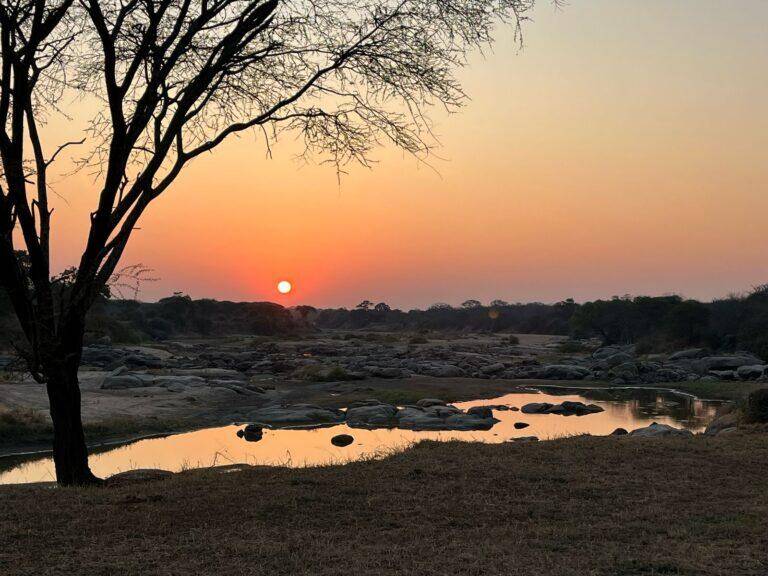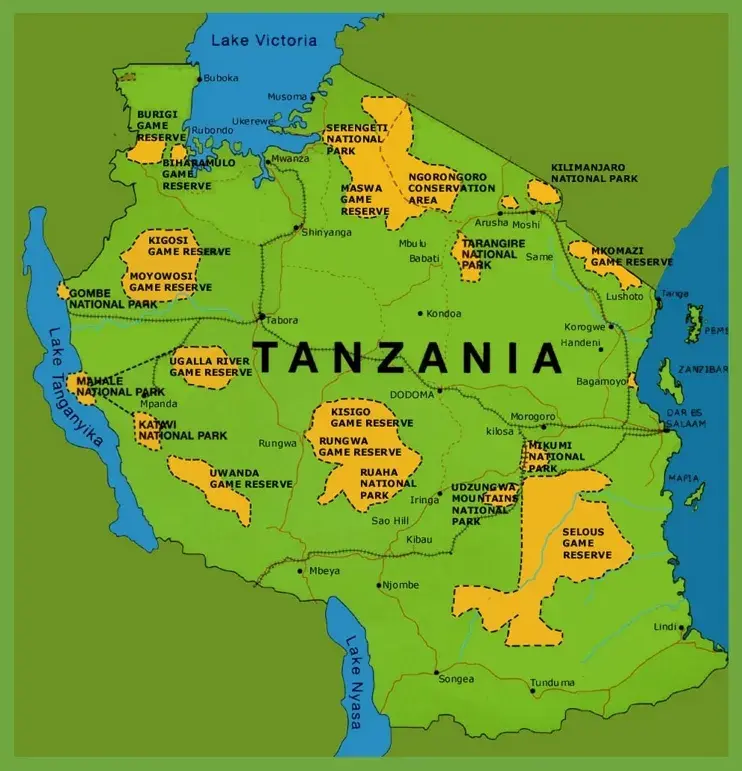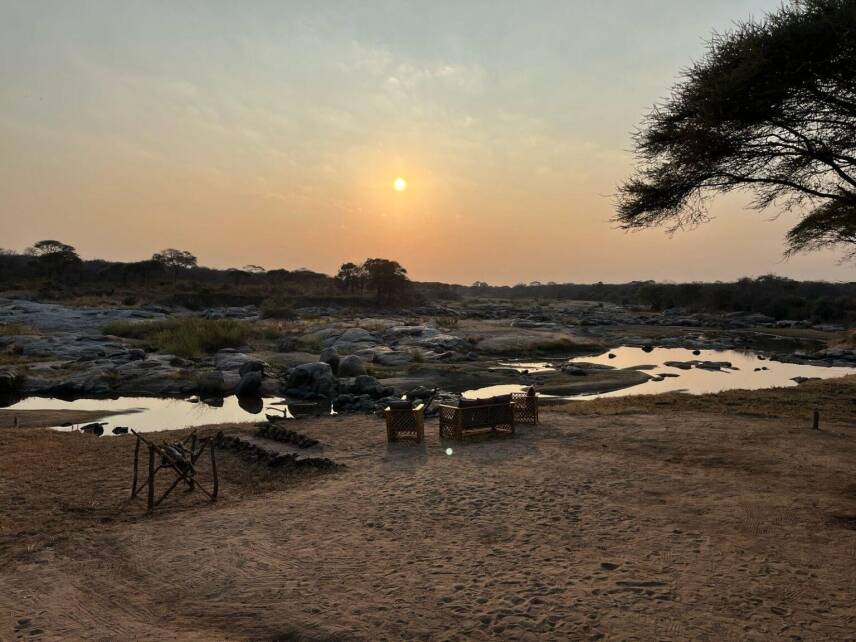Discover big game hunting in Tanzania, along with the team from Game Hunting Safaris who explored the famous Lunda Nkwambi GCA. This exceptional hunting concession is a gem in the African wilderness, and well worth considering for your next safari hunting adventure in Tanzania.
[DYNAMIC-BLOGTABLEOFCONTENT]
Tanzania Big Game Safaris
Tanzania big game safaris have for more than a century been a favorite by many famous hunters such as Theodore “Teddy” Roosevelt, Antonio “Tony” Sánchez-Ariño (Spanish hunter), Frederick Selous and Jim Corbett, often combining sport hunting with scientific research.
Today, Tanzania is a sought-after destination for American hunters, many following in the footsteps of their ancestors, intent on wanting to experience an authentic African hunt, totally free range in vast open areas of pristine wilderness.
Tanzania, previously known as Tanganyika, is well known for providing “Traditional East African Safaris,” with high levels of service and exceptional quality of game hunting trophies, including Elephant, Lion, Leopard and, of course, Cape Buffalo.
Tanzania, in fact, has the highest population of Cape Buffalo, with latest numbers standing at more than 400,000. On a Cape Buffalo hunt in Tanzania, hunters will find their dream “Dugga Boy,” be it a large bull with “broom stick horns,” big bossed or a battle scarred “scrum cap” bull.
For international and American hunters seeking to complete Africa’s Dangerous 7, Tanzania also has exceptional trophy Hippo and Nile Crocodile. Tanzania holds the current record for a 21 foot and 6-inch (6,45 meters) Crocodile, shot in 1905 by the Duke of Mecklenburg.

Big Game Hunting in Tanzania: So many Options!
Safari hunting in Tanzania provides international hunters with a variety of choices and options for safari hunting locations, from the famous Selous Reserve (now known as Nyerere National Park honouring the country’s first president), Masaailand, Rungwa and Kigosi, to name but a few.
On this occasion, the team at Game Hunting Safaris decided to pay a visit Lunda Nkwambi GCA, a hunting block of more than 400 squares miles situated in the Western area of Tanzania. Lundwa Nkwambi GCA, being a “buffer zone” to famous national parks such as Kisigo and Rungwa, would be expected to produce quality trophies.
Based on a little internet research, Lunda Nkwambi GCA was shown as a Game Controlled Area, boasting abundant wildlife and pristine areas of African wilderness. So, the team at Game Hunting Safaris had no choice but to accept the generous invitation from the outfitter and investigate for ourselves!

What is a GCA in Tanzania?
In Tanzania, a GCA is a Game Controlled Area, where protection of wildlife, wilderness and conservation is the primary initiative. But, unlike a proclaimed Game Reserve, land and resource uses are not restricted.
GCA’s form “corridors” or “buffer zones” to larger reserves and are managed by the Tanzanian Wildlife Authority, known as the “TAWA”. Residents are allowed to live and cultivate land. At Lunda Nkwambi GCA, the nearest small village is hours away from the main hunting lodge and the block is untouched by human encroachment. The small presence of Tsetse flies in the GCA, while not directly benefitting big game animals, can transmit Nagana disease to livestock, which deters local habitants from ranching in the GCA, thus protecting the wildlife and habitat and making these insects “natural game wardens.”
GCA’s in Tanzania are crucial for supporting communities on the perimeters of the hunting block and maintaining biodiversity.
Traveling to go safari hunting in Tanzania: Lunda Nkwambi
American hunters can enter Tanzania via Kilimanjaro International or Julius Nyere (Dar Es Salaam) and thereafter take a domestic flight to the administrative capital of Tanzania, the city of Dodoma. Air Tanzania is recommended for the domestic flight. For international hunters who must take multiple flights to go game hunting in Tanzania, it is recommended to overnight in Dodoma. We at Game Hunting Safaris stayed at the Best Western, which on average costs US$ 90 per night and is situated only a few minutes away from the airport with transfers to and from the hotel available. Rooms were clean, comfortable and well maintained. The hotel also has a good quality roof top bar and restaurant, with a gym for hunters wanting to get in the last “miles” before commencing the hunting safari.
Traveling from Dodoma to Lunda Kwambi is via road transfer and while only approximately 120 miles away, takes on average four and half hours.
Shortly after leaving Dodoma, the road trip becomes scenic as hunters and observers will travel through the local villages, with breathtaking views of the famous African Baobab trees. The road transfer is safe, comfortable and the last two hours into the GCA showcases true African wilderness with stunning river crossings and dense vegetation, perfect for big game hunting.
Tanzania Hunting Safari Prices at Lunda Nkwambi
One of the largest cost contributions of any big game hunting safari in remote areas, such as Niassa in Mozambique, the Benguela Swamps in Zambia, the Selous and Maasailand in Tanzania, is the need for private air charters to reach hunting camps.
When hunting in Tanzania and choosing Lunda Nkwambi GCA, due to the concession being accessible by road transfer, there is no need for private air charter. Safari hunting costs are thus “trimmed” by approximately US$ 4,000 to US$ 6,000.
Not only is this a material saving, but for American hunters who are budget conscious, this cost reduction can made the dream of an authentic East African Safari a reality for many sport hunters.
Tanzania Hunting Packages at Lunda Nkwambi
What is impressive at Lunda Kwambi, is the way that the outfitter has tailormade certain safari hunting packages. Traditionally, game hunting in Tanzania has been promoted by marketing only the cost of the Tanzania hunting license, i.e. 10-, 16- or 21-day license and then separating trophy fees from day fees.
This outfitter has customized hunting safaris and provides a combination of hunts i.e. Hippo and Croc, Plains Game, or a dedicated Cape Buffalo hunt, which also includes the trophy fee. This can be classified as “user friendly,” in that costs which are usually quoted as “additional costs,” such as CITES permits, hunting licenses, road transfer costs, government levies etc. have all been included, thereby making it easy to budget and plan.
7-day hunting packages, while paying the 10-day license, are also available which saves the hunter additional day fees, especially when targeting only a single species, such as the Cape Buffalo.
The original concept of “day fees” when safari hunting was developed to include, but not limited to the full hunting experience, including standard costs such as on territory transport, accommodations, meals, guide and professional hunting fees.
The standard hunting licenses, i.e. 10,16 and 21 are also available allowing hunters to hunt all species and quantities under the specific licenses.
The hunting packages at Lunda Nkwambi all include the associated costs of Government game scouts who’s function it is to ensure that no hunting laws are infringed and to validate the hunting license. Once the hunting safari is completed, hunters are required to sign the license. The trophy is removed from the area and allows for a trophy export certificate, ensuring that all trophy fees and trophy handling has been paid.
These packages ensure that when safari hunting in Tanzania at Lunda, hunters do not have to be qualified accountants or mathematicians to calculate price estimates.
Hunting Lodges in Tanzania
Most lodges when on a Tanzania big game safari comprise of safari tented accommodation, and Lunda Nkwambi is no different.
Lunda Nkwambi offers a standard safari tent, with comfortable beds, showers, solar electricity, running water and flushing toilets. Wifi is available in camp, and tents as well as the central dining/entertainment area offer breathtaking views of the landscape below. The main lodge features a bar area, with a fire pit overlooking the waterways below.
Enjoying a few cold adult beverages at the boma, it really was a privilege to witness Kudu, East African Impala, Dik-Dik, Giraffe, Warthog and Elephant crossing the riverbed below. Troops of Olive baboons, also known as Anubis baboon, were plentiful around the lodge, with mongooses busy in the sand banks in the late afternoons.
Bird life surrounding the lodge is plentiful, with Pied Kingfishers being abundant, along with healthy numbers Fish Eagles and Hamerkops.
On the second morning, we were fortunate enough to witness a herd of more than 200 Cape Buffalo crossing downstream in the early morning.
At night, in the comfort of our tent, two Lions kept us awake every night. At one stage we were certain one of the males was no less than a few yards away. When game hunting in Lundwa Nkwambi, keep your rifle alongside your bedside, this concession is truly wild Africa!
While listening to the groans, snarls, grunts and moans of the two Lions, we wished every night that we were fortunate enough to have a hunting license for Lion. These free-range adult males found in Tanzania are huge and make exceptional trophies.
The food was great, healthy, filling and well prepared. On any hunt in Tanzania, always ensure you advise the outfitter of any special dietary or drinks requirements well in advance. Concessions can be miles away from retail outlets.
Challenges when operating Game Hunting Concessions in Tanzania
We at Game Hunting Safaris often hear the phrase "big game hunting in Tanzania is so expensive" and correctly so. Professionally managing and operating as an outfitter in these remote concessions costs big money, and hunters are required to pay a premium for access into these remarkable areas.
The reality is that when purchasing supplies, whether food, drinks or maintenance items, managers and team members need to travel many hours and miles to acquire and collect them, often experiencing stock shortages of critical supplies which can hinder operations.
This excludes costs of capital projects, delivery of trophies for “dip and pack,” maintaining solar power, generators and general upkeep.
Equipment such as properly equipped four by four trucks, radio communications, medical kits and back up vehicles are expensive to source, maintain and operate in extreme environments reducing the life span of these assets.
Monitoring animal migration patterns and health, implementing effective anti-poaching practices, staff training and development and knowing where the exceptional trophies are, cost time and money.
The Game Hunting Concession: Feedback for International Hunters
Unfortunately, we at Game Hunting Safaris had limited time during this trip to Tanzania. We would have liked to spend more of our resources exploring, but with the size of Lunda Nkwambi exceeding 405 square miles, it is a large area to cover, even if not on a hunting safari.
The concession is packed with spectacular Baobab trees and woodland areas. The bush is thick, with scattered open areas attracting a wide variety of African plains game such as Grants and Thomson’s Gazelle, Kudu, Impala, Dik-Dik, Sable and Roan. Giraffes are plentiful, but as Tanzania’s national animal, they are not legally allowed to be hunted.
Game trails are plentiful, with loads of activity making walking through the scrub a little easier. We bumped into a herd of more than 150 Cape Buffalo, with plenty of big shootable bulls. Lunda Nkwambi is ideal for hunters looking to hunt Cape Buffalo “in the thick” and at close range, 20 yards and less. In this environment, an open sight double rifle such as a 470/500 Nitro Express will work perfectly, with a quality expanding bullet loading for first shot and solids for any “follow ups.”
The concession is packed with other dangerous game such as Lions, Leopards and big Elephants. You do not walk around, unless carrying a rifle or in the company of your professional hunter. This truly is wild Africa!
The river flowing through the concession has exceptional quality Hippos and Crocodiles. Taking a short walk through the dry areas in the riverbed, the river sand was covered with dangerous game spoor, and that of specialty animals such as the Spotted Hyena and Honey Badger were plentiful.
As night hunting in Tanzania is illegal, hunting big black maned lions, tom cats and Hyena is even more challenging. Tanzania is the only African country where hunting Striped Hyena is legal, and these magnificent animals are available and are found within Lunda Kwambi.
Tips when Hunting in Tanzania: Lunda Nkwambi GCA
- Terrain varies through Africa. Pack long pants and sleeved shirts as additional protection against the sun and the thick brush. Pack a wide brimmed hat covering your ears.
- While the outfitter has a general medical emergency kit available, with the concession being so remote, pack a few basic medical supplies such as headache tablets, rehydrate, general antibiotics, antihistamine cream and personal hygiene products.
- Pack good quality walking shoes and extra boot laces.
- Do not overpack, daily laundry services are available.
- Know the Tanzanian hunting laws, licensing requirements and firearm/ammunition restrictions.
- Plan the hunting safari in advance so that the “best times” can be secured.
- Study shot placement of the target species in advance.
- If you after trophy Cape Buffalo, bring “enough gun” and do not shoot the first one you see.
Frequently Asked Questions
Do I require a permit to hunt in Tanzania?
Yes, hunting permits are required. These permits are issued by the Tanzania Wildlife Management Authority (TAWA) and are divided into three different categories, namely regular 10, 16, and 21-day hunting permits.
Does Tanzania allow night hunting?
No night hunting is undertaken, it is illegal. All hunting in Tanzania needs to occur during daylight hours. This includes 30 minutes before sunrise and 30 minutes after sunset.
What is the most dangerous member of the Big 5 to hunt?
While many hunters consider the leopard to be the most dangerous, it is largely agreed that the Cape buffalo ticks the boxes as the most dangerous Big 5 species to hunt. Known for its largely unpredictable nature, aggressive and grumpy attitude, this 2,000-pound wall of muscle is not to be messed with. In fact, its nicknames of “Africa’s Black Death” and “The Widow Maker” reference its killing ability.
What rifle is required to hunt dangerous game in Tanzania?
When hunting the Big 5 or other dangerous game, a minimum of a .375 is required.
Can I hunt dangerous game on Lunda Nkambi?
Yes, members of Africa’s Big 5 can be hunted on the GCA, including the Lion, Leopard, Elephant, and Cape Buffalo.
Is hunting in Tanzania suited to both Novice and Seasoned Hunters?
Tanzania offers a variety of game hunting packages suitable for all levels of hunting abilities, from novice to seasoned and experienced hunting enthusiasts. For those beginning their hunting career, it is recommended to take the shorter permit durations, offering various plains species such as antelopes, Zebras, Warthogs, and small cats. For those wanting the ultimate in big game hunting, Tanzania offers a range of big and dangerous game hunting, including the notorious Cape Buffalo, Lions, Leopards, and Elephant trophies.
Conclusion
If safari hunting in Tanzania is on your bucket list, and if you are looking for an exceptional game hunting concession, Lunda Kwambi is a gem in the wild.
Author: PC van Wyk
